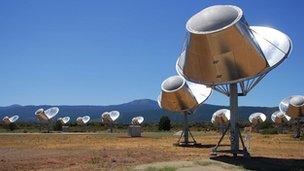Seti Live website to crowdsource alien life
- Published

The Seti Allen Telescope Array is based in Northern California
A website has been launched that aims to get the public involved in the search for extraterrestrial life.
Announced at the TED (Technology, Entertainment and Design) conference in Los Angeles,the site, externalwill stream radio frequencies that are transmitted from the Seti (Search for Extraterrestrial Intelligence) Allen Telescope Array.
Participants will be asked to search for signs of unusual activity.
It is hoped the human brain can find things the automated system might miss.
The website is the latest stage in a quest "to empower Earthlings everywhere to become active participants in the ultimate search for cosmic company".
The project is being run by Dr Jillian Tarter, winner of the TED Prize in 2009 and director of the Seti Institute's Center for Seti Research.
She has devoted her career to hunting for signs of sentient beings elsewhere.
She hopes Seti Live will help build upon the community of scientists and technologists already involved in the search.
"There are frequencies that our automated signal detection systems now ignore, because there are too many signals there," she said.
"Most are created by Earth's communication and entertainment technologies, but buried within this noise there may be a signal from a distant technology.
"I'm hoping that an army of volunteers can help us deal with these crowded frequency bands that confuse our machines. By doing this in real time, we will have an opportunity to follow up immediately on what our volunteers discover."
Grand adventure
The Seti Institute has struggled to keep afloat in recent years and relies on public donations. It has some high profile backers, including including former astronaut Bill Anders, sci-fi author Larry Niven, and Hollywood actress Jodie Foster.
Crowdsourcing data has proved to be a very useful tool for scientists in a range of disciplines.
Collaborating on the Seti project is Zooniverse, home to some of the internet's largest and most successful citizen science projects.
"Over the last few years, we have learned about the incredible desire of hundreds of thousands of people to take part in scientific research as they've used Zooniverse to classify galaxies, explore the Moon and even to discover planets," said Chris Lintott, Zooniverse's principal investigator.
"With Setilive.org, we're very excited to be inviting them on this grandest of adventures."
- Published9 January 2012
- Published5 December 2011
- Published9 January 2012